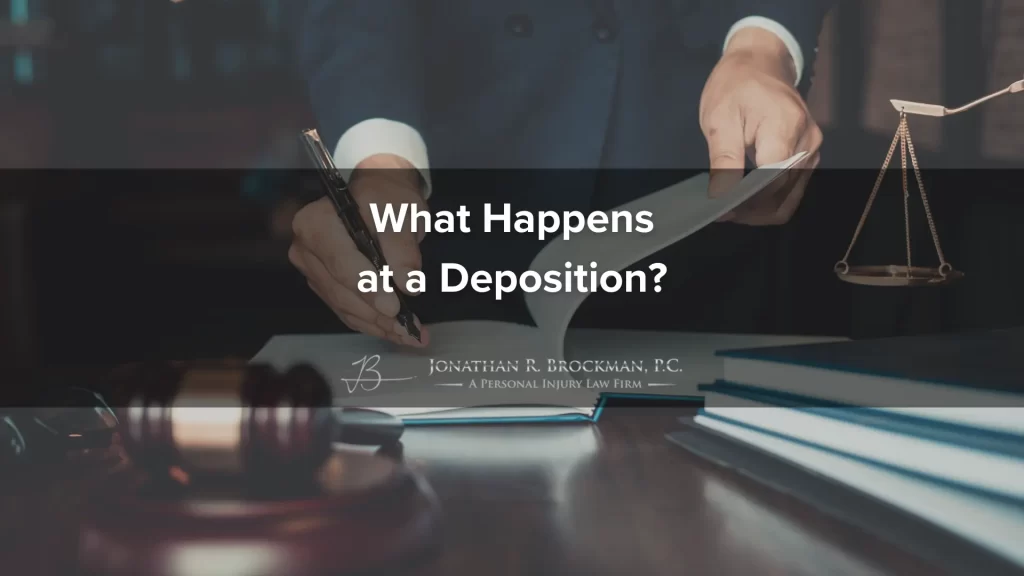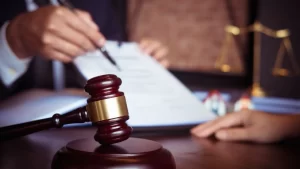Posted on Sunday, January 1st, 2023 at 1:24 pm
 A deposition often occurs during the discovery process in a personal injury lawsuit. Discovery involves the plaintiff’s lawyer and defense attorney requesting evidence from each other. Either lawyer can depose the other’s client or a witness to the incident.
A deposition often occurs during the discovery process in a personal injury lawsuit. Discovery involves the plaintiff’s lawyer and defense attorney requesting evidence from each other. Either lawyer can depose the other’s client or a witness to the incident.
Depositions can be stressful. However, adequate preparation can help you get through the process smoothly. Knowing what you should and should not say before the deposition starts can prevent you from offering information that helps the opposing party or damages your case.
Here, you will learn what you need to know about depositions, including how they work and what you should do to prepare.
What Is a Deposition?
A deposition is a method of obtaining evidence from witnesses in a personal injury case. Witnesses can include:
- Expert witnesses, such as accident reconstruction specialists or medical providers
- An eyewitness who saw the incident occur
- Plaintiff
- Defendant
The witness and their attorney meet with the lawyer conducting the deposition. The session can occur in a conference room or any location agreed upon in advance. A court reporter attends to record everything each person says using a recording device or stenograph machine. When the deposition concludes, the court reporter will use their recordings to create a written transcript.
How the Deposition Process Works
 A deposition begins with the court reporter swearing in the witness. The person conducting the deposition can start asking questions. In a personal injury lawsuit, the plaintiff’s attorney can depose the defendant, and the defense lawyer can depose the plaintiff. Both lawyers can use the opportunity to gather the necessary information to strengthen their case or disprove the other’s evidence and arguments.
A deposition begins with the court reporter swearing in the witness. The person conducting the deposition can start asking questions. In a personal injury lawsuit, the plaintiff’s attorney can depose the defendant, and the defense lawyer can depose the plaintiff. Both lawyers can use the opportunity to gather the necessary information to strengthen their case or disprove the other’s evidence and arguments.
You should receive a notice of deposition from the defense lawyer if they want to depose you. Typically, you have enough time to meet with your attorney and prepare for the upcoming date. Attendance is mandatory. If there’s a scheduling conflict, you must notify the lawyer immediately to move the deposition to a different date. However, they’re not required to comply with your request. If they choose not to change the date of your deposition, you must show up.
Your attorney will attend the deposition with you. They can advise you of your rights and how to respond to questions before the deposition begins. However, their level of participation during the deposition is minimal. They might object if they believe any questions are irrelevant or inappropriate but can’t answer questions for you.
Questions the Lawyer Might Ask During Your Deposition
Depositions commonly involve a series of questions regarding the accident. The attorney wants to obtain relevant information about your injury, how the incident happened, and other details to build a defense for you.
Questions commonly asked in personal injury depositions include:
- Background information – Typically, depositions begin with basic information. The attorney will ask for your name, address, phone number, and other background details.
- Details of the incident – The defense lawyer wants to know the events leading up to the accident. They might ask about your actions before the incident and whether you saw what their client was doing. They might also ask about eyewitnesses and whether you talked to any of them. They can choose to depose those witnesses to get their version of events.
- Extent of the injury – The attorney can question you about the nature and severity of your injury. They might ask you to describe your symptoms and whether any worsen during specific activities. You might have to describe the physical or mental limitations of the injury and how it affects your daily routine.
Helpful Tips to Follow During a Deposition
Feeling overwhelmed is normal. Depositions can be scary. However, you can breeze through yours by following these tips:
- Speak about the facts – Only discuss facts. You should never speculate or offer your opinion. Guessing an answer to a question can backfire. It can appear as if you lied if you change your story later.
- Think before speaking – You’re not required to answer immediately after each question. Carefully think about your response so you don’t say the wrong thing.
- Ask for clarification – Depositions can take hours to complete. You might start strong, but fatigue can set in and lead to confusion. Ask the lawyer to clarify or repeat a question if you feel confused or unsure.
- Be honest – You must tell the truth no matter what. Lying is not an option during a deposition. You are under oath and can face severe consequences if you lie and someone finds out.
Read more: How to Know if Your Deposition Went Well
Injured in an Accident? Contact Jonathan R. Brockman, P.C.
At Jonathan R. Brockman, P.C., our personal injury attorneys understand the importance of recovering maximum compensation for medical bills and other expenses. We have experience representing injured clients in all aspects of personal injury cases, including depositions.
If you sustained injuries in an accident due to someone else’s negligence, call us at (770) 205-8827 for a free consultation to learn more about what we can do for you.
Related pages:
